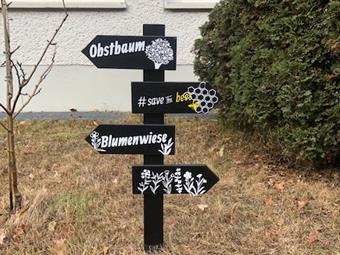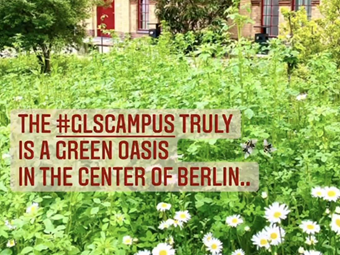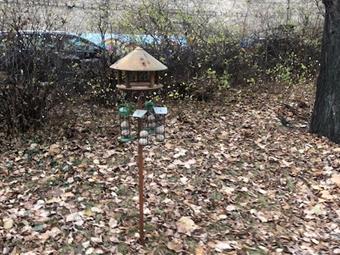
We are delighted to award GLS IH Berlin the first “Protecting our Planet” environmental sustainability badge of 2023.
They are doing many things both to encourage more sustainable behaviour, and to cut down on the more harmful aspects of the business of operating a large school.
One of the most innovative things they have implemented is the “To Good To Go” app.
As a large study abroad school with a hotel restaurant, food waste could become a concern.
The food production industry, from farming to consumption, is one of the biggest emitters of greenhouse gasses and is responsible for huge areas of habitat loss around the world. We all need to eat, but when we waste it that is just crazy.
The “Too Good To Go” people claim that
- Food waste is responsible for 10% of greenhouse gas emissions (that's more than the whole aviation industry).
- We waste 2.5 billion tonnes of food annually, whilst 828 million people go hungry every day.
- Wasting food costs the world $1.2 trillion each year.
(Source https://www.toogoodtogo.com/en-gb/)
So, the app signals to potential customers surplus food which they can buy for a reduced price. It allows companies to both reduce food surplus and get money back for goods that would otherwise have been thrown away - a win-win situation.
Last year GLS IH Berlin sold about 600 bags through this scheme. This means that people in their local community had discounted food, and about 1.39 tonnes of CO2 was saved. An additional benefit to the school was that new customers were encouraged to visit the restaurant and become regular customers. The school has measured this, and their data shows that 76 percent come back as regular customers.
A definite “win-win”.
To manage the whole organisation’s coordinated approach a “sustainability officer” has been appointed. Together with a small team, the "Green Team", this person takes care of all topics and tasks relating to sustainability. There is communication and training to all staff that being sustainable involves everyone, and everyone should make their contribution.
With the efforts of the sustainability officer and the “Green Team”, the school are targeting being “Carbon Neutral by the end of 2025”. This includes reducing energy consumption by 15% by the end of 2023, partial conversion to renewable energies for heating and electricity by the end of 2025, and compensation of non-avoidable CO2 emissions by the end of 2025.
Motion detectors and smart thermostats to reduce the consumption of energy are in use currently to work towards this target. There are plans to investigate the feasibility of installation of solar panels on the roofs, and investigate installation of e-charging pillars to encourage electric vehicle usage.
Progress towards these targets are published in an annual report including sustainability, diversity and economic efficiency.
This is a wonderful and ambitious target, which IHWO are delighted to celebrate.
Getting students involved is central to their plans. Topics are discussed in the classroom and there are plans to integrate even more in curriculum. There are a lot of notices around the school and on the school’s social media accounts encouraging students to use resources sustainably. There is a RECUP system on campus so there are no longer any disposable coffee cups. To reduce use of plastic bottles they have installed water dispensers on campus and provide glass bottles for offices to fill, and reusable and sustainable water bottles are available for sale in the school reception.
Traditional petrol and diesel transport is a large emitter of greenhouse and polluting gasses, so staff and students are encouraged to use bikes for local commutes, or public transport. Bicycle leasing and public transportation subsidies are offered to employees.
As many meetings as possible are held by video call or hybrid, and online training opportunities are offered.
GLS IH Berlin takes its place within it’s local community seriously. They regularly donate to the RambaZamba Theater in the Kulturbrauerei and Pfeffersport e.V. and support two important inclusion projects in the neighbourhood. They regularly award scholarships (short and long term) for German courses to refugees and have donated language courses worth more than 17,000 euros and hotel rooms worth more than 4,000 euros to support displaced Ukrainianas.
GLS IH Berlin is lucky to have its own campus with beautiful grounds. They are promoting biodiversity by planting two herb gardens, fruit trees and flower meadows, installing a bee hotel, insect troughs and birdhouses, and install biodiversity-enhancing roof plants. Grass and plant cuttings are also naturally composted, being used again the next year in the gardens. The gardens and green areas are irrigated from a natural well and in-house filtration trenches – not treated and piped drinking water.
Stephanie, says:
Working in a school that cares so much about this issue and is aware of its responsibilities makes me proud. It's not just about the economic aspects, but the sustainability aspect is also taken into account in the decisions. We attach great importance to the sustainable use of resources and would like to make our contribution to this as a company and a team. We also see the issues of diversity and corporate social responsibility as part of our sustainability concept.


